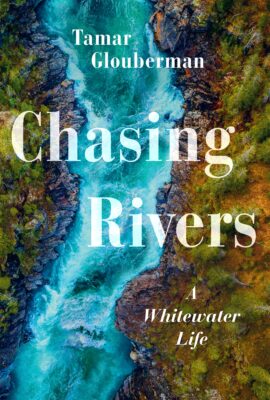Tamar Glouberman’s memoir Chasing Rivers is full of honest, captivating stories about the allure and threat of different forms of risk. Glouberman, a whitewater rafting tour guide, is thrilled when navigating dangerous waterways and having sex with men she barely knows, but avoids emotional challenges like telling a casual regular hookup that she’s fallen for him. Her struggles – to trust herself, to sanely take the perspectives of others into account, to accept her own fallibility – are relatable even to those of us who have never had her adventurous spirit.
One central question of the memoir is what makes a risk worth taking, or not. Glouberman’s extreme activities, both athletic and sexual, lead to some terrible consequences. Her reluctance to make herself vulnerable in other ways leads to disappointment and frustration. Do these negatives outweigh the positives? Are her choices based on what is really best for her? Right up to the end, Glouberman doesn’t seem sure; this uncertainty gives the book’s emotional journey a tentative, sometimes repetitive tone.
Chasing Rivers Douglas & McIntyre
A Whitewater Life
Tamar Glouberman
$26.95
paper
272pp
9781771623414
Glouberman receives ambiguous or downright bad advice from lots of people, and lacks the self-conviction to consider this advice rationally, reject it, or embrace it. For example, as she is heading to a new job, someone who knows her boss-to-be tells her, “You don’t want to work for Graham. He’s a real asshole.” Graham goes on to be a great supporter but also to cause her a lot of suffering: the descriptor “asshole” is inadequate, but never entirely refuted either. This intersection of her own experiences and others’ perspectives is again rich territory for exploration, but rather than navigating this difficult river, Glouberman seems to portage it. Graham’s thread feels loose, as do many others.
The book’s jacket flap tells us, “[W]hen a rafting trip ends in a fatal accident, Tamar is consumed by guilt and exiles herself from the rivers she loves, convinced she can never return.” This is a compelling setup for a story about risk, but there is a structural problem: this “fatal accident” happens 212 pages into a 268-page story. The reckoning in the last section is rushed, and many of the events here – including Glouberman’s epiphany, which takes place over a couple of terse pages – seem disconnected from what came before. The jacket copy itself might be responsible for the feeling of imbalance at the end – maybe the fatal accident is not the crux of this story – but regardless, a more patient treatment of the aftermath would have made the denouement more satisfying.
Some different technical decisions might have done better justice to Glouberman’s very interesting material. Even in her writing, she doesn’t quite take emotional risks that match her physical ones: she repeats “It’s all my fault” when it’s high time to start illustrating her evolution, and so we lose out on a richer understanding of her inner journey. Nevertheless, the details of Glouberman’s unique and exciting life are engaging; adventurers, both real and vicarious, will find much to enjoy in these pages.mRb






0 Comments